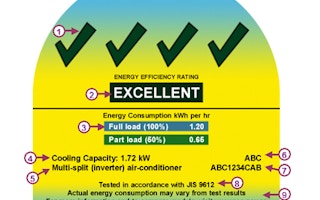The appliances in your home are about to get greener – and electricity bills could shrink in tandem.
The Government is raising the mandatory energy-efficiency standards of refrigerators and air-conditioners sold on the market from next year. These two items typically make up half a household’s energy consumption. The standards for lights will also be raised, by 2014.
This means that more of such appliances that do not hit a certain energy efficiency target will not be approved for sale.
It will also be harder to qualify for the three- or four-tick classification. The more ticks a gadget carries, the more energy-efficient it is. Four ticks are the maximum. Those with no ticks cannot be sold.
Minister for the Environment and Water Resources Vivian Balakrishnan announced the tougher standards in Parliament on Tuesday, adding that the scheme might include television sets in future.
He was responding to MP Teo Ho Pin (Bukit Panjang) who asked what measures the Government was taking to promote energy efficiency in households.
Dr Balakrishnan said that by removing inefficient models from the market, ‘consumers avoid being locked into the high operating cost of inefficient appliances’.
One home owner who has already decided against inefficient appliances is Mrs Kim Lin Harbick, 32. ‘It makes sense to get energy-efficient appliances for the home as it saves money. I’m glad the Government is also raising the standards.’
Manufacturers The Straits Times spoke to said they had been preparing for stricter standards. Panasonic Asia-Pacific spokesman Christopher Lim said the company welcomes the move but added that the Government could have sought the views of affected companies before setting the standards. He said his company has seen more sales of its energy-efficient products. ‘Consumers are starting to understand the benefits of these products even if the initial cost of energy-efficient products may be slightly higher.’
This article was originally published at The Straits Times.










